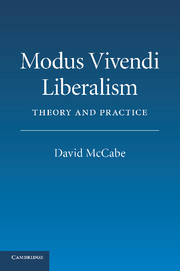Book contents
- Frontmatter
- Contents
- Acknowledgments
- PART I STARTING ASSUMPTIONS
- PART II THE FAILURE OF THE MAIN ARGUMENTS
- PART III MODUS VIVENDI LIBERALISM
- 7 The case for modus vivendi liberalism
- 8 The challenge of gender equality
- 9 Compulsory education in the MVL state
- 10 The limits of modus vivendi liberalism
- Bibliography
- Index
8 - The challenge of gender equality
Published online by Cambridge University Press: 06 July 2010
- Frontmatter
- Contents
- Acknowledgments
- PART I STARTING ASSUMPTIONS
- PART II THE FAILURE OF THE MAIN ARGUMENTS
- PART III MODUS VIVENDI LIBERALISM
- 7 The case for modus vivendi liberalism
- 8 The challenge of gender equality
- 9 Compulsory education in the MVL state
- 10 The limits of modus vivendi liberalism
- Bibliography
- Index
Summary
WOMEN AND CULTURAL GROUPS
By and large the critic I have been imagining does not generate de novo the normative framework he endorses, but comes to it through a process of responding to and often reshaping various formative influences around him. Especially influential here are those intergenerational communities that strive to sustain and transmit their distinct identity-conferring norms. Such groups define themselves by a common normative framework and set of practices they see as properly structuring a person's world in a range of important contexts: how the young should be educated, standards of appropriate behavior and dress, relations between the sexes, family life, recreation, religious worship, and so on. These cultural groups, with their obvious potential to shape deeply the inner lives of liberal citizens, present a serious challenge to the liberal state: for while they may produce citizens who object to liberal commitments, the importance of expressive liberty means liberal states must tolerate those efforts to some substantial degree.
In this and the following chapter I consider the implications of MVL with respect to such groups, concentrating on the areas of gender equality and compulsory education. Not only are these areas of intrinsic interest and practical urgency, but discussion of them can as well help clarify the nature of the minimal universalism to which MVL is committed. And since some may worry that minimal universalism is too thin to defend important human interests, it makes sense to concentrate on those individuals historically most vulnerable to abuse – women and children.
- Type
- Chapter
- Information
- Modus Vivendi LiberalismTheory and Practice, pp. 166 - 195Publisher: Cambridge University PressPrint publication year: 2010

